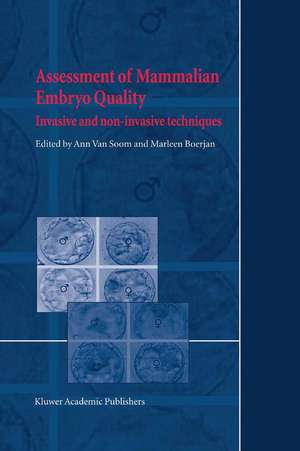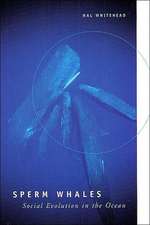Assessment of Mammalian Embryo Quality: Invasive and non-invasive techniques
Editat de A. van Soom, M. Boerjanen Limba Engleză Paperback – 10 oct 2012
For the first time, studies concerning the human embryo as well as embryos from domestic species are brought together. The central theme of the book is "the assessment of mammalian embryo quality". In 15 chapters, written by well-known scientists, different aspects of the assessment of mammalian embryo quality are summarized. Non-invasive and invasive techniques to evaluate embryo quality are separated in two parts.
In addition the book is provided with appendices on practical aspects and, thus, the book should be present in each laboratory for IVF and IVP.
| Toate formatele și edițiile | Preț | Express |
|---|---|---|
| Paperback (1) | 1102.10 lei 6-8 săpt. | |
| SPRINGER NETHERLANDS – 10 oct 2012 | 1102.10 lei 6-8 săpt. | |
| Hardback (1) | 1113.63 lei 6-8 săpt. | |
| SPRINGER NETHERLANDS – 31 iul 2002 | 1113.63 lei 6-8 săpt. |
Preț: 1102.10 lei
Preț vechi: 1160.10 lei
-5% Nou
Puncte Express: 1653
Preț estimativ în valută:
210.88€ • 220.77$ • 174.49£
210.88€ • 220.77$ • 174.49£
Carte tipărită la comandă
Livrare economică 05-19 aprilie
Preluare comenzi: 021 569.72.76
Specificații
ISBN-13: 9789401039093
ISBN-10: 9401039097
Pagini: 440
Ilustrații: XXVII, 406 p.
Dimensiuni: 155 x 235 x 23 mm
Greutate: 0.61 kg
Ediția:2002
Editura: SPRINGER NETHERLANDS
Colecția Springer
Locul publicării:Dordrecht, Netherlands
ISBN-10: 9401039097
Pagini: 440
Ilustrații: XXVII, 406 p.
Dimensiuni: 155 x 235 x 23 mm
Greutate: 0.61 kg
Ediția:2002
Editura: SPRINGER NETHERLANDS
Colecția Springer
Locul publicării:Dordrecht, Netherlands
Public țintă
ResearchCuprins
1: Human embryo morphology and developmental capacity.- 1. Introduction.- 2. EggCyte™ Embryology Database.- 3. Zygote Morphology.- 4. Cleavage Stage embryos.- 5. Morulae and Blastocysts.- 6. Conclusions and future directions.- 2: Morphological evaluation of embryos in domestic species.- 1. Introduction.- 2. Developmental processes in embryos.- 3. Classification of embryos by stage of development.- 4. Classification of embryos by quality grade.- 5. Relationship between embryo morphology evaluation and pregnancy rates.- 6. Factors affecting embryo evaluation.- 7. Embryo morphology in other domestic species.- 8. Conclusion.- 3: Metabolic markers of embryo viability.- 1. Introduction.- 2. General characteristics of embryo metabolism.- 3. Non-invasive techniques of evaluation.- 4. Evaluation of embryo viability after embryo manipulation.- 5. Conclusions.- 4: Embryo quality and freezing tolerance: cryopreservation of human embryos.- 1. Introduction.- 2. Selection of embryos for cryopreservation: features related to freezing tolerance.- 3. Conclusion.- 5: Factors influencing cryopreservation of domestic animal embryos.- 1. Introduction.- 2. Factors affecting freezing tolerance.- 3. Cryobiological aspects.- 4. Possible methods to improve freezing resistance.- 5. Conclusion.- 6: Timing of embryo development.- 1. Introduction.- 2. Timing of embryo development as an indicator of viability.- 3. Genetic regulation of embryo development timing.- 4. Timing of events during fertilization.- 5. Culture media effects on timing of embryo development.- 6. Timing of human embryo development.- 7. Summary and conclusions.- 7: Biopsy and preimplantation diagnosis of human embryos.- 1. Introduction.- 2. Preimplantation genetic diagnosis (PGD).- 3. Obtaining oocytes and embryos.- 4. Methods ofoocyte and embryo biopsy.- 5. Methods of diagnosis.- 6. Use of PGD technology for evaluation of mammalian embryo quality.- 8: Biopsying and genotyping cattle embryos.- 1. Introduction.- 2. Embryo biopsy methods.- 3. Pregnancy rates.- 4. DNA tests performed on the biopsy.- 5. Conclusion.- 9: Multiphoton microscopy for imaging mammalian embryos.- 1. Introduction.- 2. Multiphoton microscopy basics.- 3. Embryo culture for imaging.- 4. Viability (laboratory species).- 5. Imaging depth (domestic species).- 6. Maximizing information from rare specimens (non-human primate).- 7. Potential future directions.- 8. Conclusion.- 10: Is the frequency of chromosome abnormalities influenced by in vitro techniques?.- 1. Introduction.- 2. Methodology.- 3. Chromosome abnormalities in embryos.- 4. Is the incidence of chromosomal abnormalities increased by in vitro culture?.- 5. Conclusion.- 11: Differential staining of inner and outer cells to assess mammalian embryo quality.- 1. Introduction.- 2. Embryonic development.- 3. Differential staining of the blastocyst.- 4. Conclusion.- 12: Apoptosis in mammalian embryos.- 1. Introduction.- 2. Definitions of cell death.- 3. Characteristic features of apoptosis in mammalian embryos: incidence and detection.- 4. Examples of application.- 5. Advantages and disadvantages of different techniques.- 6. Conclusions.- 13: Electron microscopy of pre-hatching mammalian embryos: the ultrastructure of cattle, swine and horse embryos.- 1. Introduction.- 2. Basic considerations on the ultrastructure of pre-hatching mammalian embryos.- 3. Ultrastructure of the oocyte, zygote and pre-hatching embryo in cattle.- 4. Ultrastructure of the zygote and pre-hatching embryo in swine.- 5. Ultrastructure of the zygote and pre-hatching embryo in horse.- 14: Differences ingene expression patterns related to origin of preimplantation embryos.- 1. Introduction.- 2. Methodological aspects of mRNA expression analysis.- 3. Gene expression patterns in bovine preimplantation embryos.- 4. Alterations in gene expression patterns of preimplantation rodent embryos.- 5. Gene expression patterns in human embryos.- 6. Summary and concluding remarks.- 15: Protocols.- Appendix I: The electron microscope.- Appendix II: Processing of eggs for transmission electron microscopy.- Appendix III: Human preimplantation diagnosis pcr and RT-PCR.- Appendix IV: Human preimplantation diagnosis fluorescence in situ-hybridization (FISH) on individual blastomeres.- Appendix V: Fluorescence in situ-hybridization (FISH) on metaphases in bovine embryos.- Appendix VI: Differential staining.- Colour plates.









